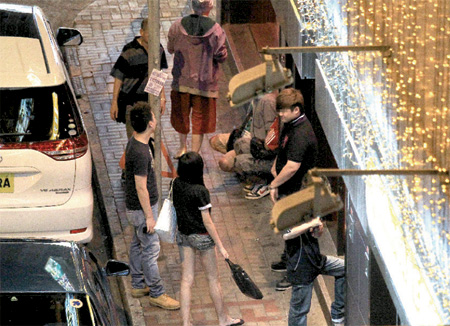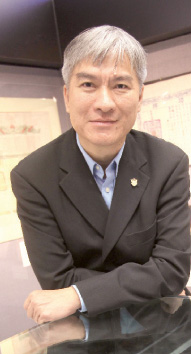Bloody-minded youth
Updated: 2011-06-23 06:44
By Andrea Deng(HK Edition)
|
|||||||||
|
Teenage gangsters and young deviants, suspected to have relations with triad members, hang out at the gate of a game center in Shek Wu Hui, Sheung Shui at night. Photo by Edmond Tang |
They are lost, suffer low self-esteem, come from poverty and abusive backgrounds. They are youngsters who can't find respect - with nowhere else to turn but to the triad societies who give them a sense of belonging they've never known before. Experts note a disturbing trend that recruits entering the triads are increasingly becoming younger. Andrea Deng reports.
It's 11 pm and it's plain, something is going on down that 50-meter-long alley in Shek Wu Hui. A dozen kids, maybe 14-16, shifting around in an agitated manner, can be going nowhere. The orange light from the street lamp above catches odd highlights revealing the dye jobs on some of the kids' hair. Some have their arms tattooed and black T-shirts can be seen on more than a few. There is an air of nervous apprehension as if something is going to happen.
Loud music blares from the game arcades across the street, where inside, young guys are focused on games like Warcraft and King of Fighters.
A couple of older kids, maybe 17-or-19-year-old, seem to be watching for something, standing like sentinels at the entrance to the alley that leads to the back of the games arcade.
About 10 meters away is the entrance to still another alley - this one narrower and much, much darker. A few 20-somethings are hanging out there. They smoke. Some stand. Some squat. Some are on cell phones.
A couple of cars are cruising around the streets, windows rolled down. Between the two they carry ten young adults. The conventional wisdom down here is that if they have to "get away", they can do it faster with the air conditioner turned off.
There's going to be a fight, says an insider, who knows the scene. The scenario has become pretty common over the last few months. Two branches of the local Wo Shing Wo triad are having a feud. The battles play out in Shek Wu Hui, the district hub surrounded by scores of public housing estates in Sheung Shui. The stage seems set for a bloody battle.
Only the timely arrival of the Police Department's Emergency Unit is able to defuse the situation and prevent violence.
|
Lam Kin-keung, a retired detective station sergeant who spent eight years serving at the Organized Crime and Triad Bureau and has been studying local triads for decades. Photo by Edmond Tang |
During Spring Festival this year, a similar scenario played out nearly a dozen times in Tseung Kwan O. Groups made up of dozens of teenagers and young adults would come together, scream insults at one another and sometime around midnight, have a fight. Some of the combatants were as young as 12. Chan Kai-wai, a Sai Kung District Council member, says the root of the conflict is internal squabbling within a triad tong Sun Yee On or with 14K.
Around 2 am on June 20, a dozen kids showed up in Causeway Bay. Some carried iron pipes. Some were ready to fight with bare fists. They set upon another group of youngsters. A 14 and a 16-year-old, possibly connected to the triads, were later arrested on suspicion following the attack, according to Wen Wei Po.
Teenage gangs made up of deviant kids have been around in Hong Kong for a long time. Some part of the city are traditional hotbeds, not least in the New Towns like Sheung Shui, Fanling, Tuen Mun, Tai Po, and Tseung Kwan O. They seem to flourish where public housing estates abound. Some gangs have direct, definitive links with triads. With others the gangland connection is more ambiguous. Either way they get together in groups and fight with other groups. They're also getting younger and younger. That's probably the most disturbing part.
"This is because the gang leaders of different factors (branches) - whether they belong to the same triad tong or not - are having more and more direct control over their followers than the dragon heads do. In order to augment their power, the gang leaders have to recruit lots of deviant kids," said Lam Kin-keung, a retired detective station sergeant who spent eight years with the Organized Crime and Triad Bureau. He's been studying the local triads for decades.
"The phenomena of the triad committing crimes in recent years shows not only more active moves among lower level of triad members, but that they are younger. The expansion of a triad branch can happen very quickly. And the way they commit crimes is getting more ferocious," said Lam, who is writing a book on triads in Hong Kong.
The local gang bangers are said to be easily recognizable from the way they walk and their general deportment. They have a characteristic stride. They point with their thumbs when referring to themselves. Their language is coarse and salted with gang argot that often slips out unintentionally.
Most of the time, police keep things under control. They get a tip off of something happening from somebody connected to the inside, or a passerby notices something amiss. Sometimes, when police are caught unprepared, things can get out of hand and become very dangerous. That's when the iron pipes, glass bottles, and even steak knives secured down dark alleys come out and armed youths fly out of cars carrying out bloody attacks. Lam said only six or seven times during his 34-year career did he see bloodshed on a large scale in triad battles.
Chan, the district councilor, said some of the young deviants don't belong to a triad, nor are they called on to pledge allegiance to any triad leader when they are in this kind of free-for-all.
Wilson Chan, a supervisor in youth-at-risk service for the Hong Kong Federation of Youth Groups, agreed with the district councilor's assessment of the present situation.
"First, they might be just a group of 12-or-13-year-old kids who hang out together because they have family problems or do badly in their school work," said Wilson Chan.
"They smoke and drink together, sometimes commit vandalism in the park. But what's more compelling, they start to settle their conflicts in groups rather than by themselves, and they'll bully other kids at school," he continued.
The conflicts can come from almost anywhere - even rivals for some girl's attention. Sometimes it's simply a matter of not liking the looks of someone who belongs to another group. It goes on and on. One kid gets punched - he calls up some friends to help him get revenge. It doesn't necessarily take weapons to inflict serious injury.
"The New Towns, where public houses attract a large population and more of the households are undereducated and underprivileged, are the breeding grounds for triads. The kids who grow up there riding bicycles around the neighborhood are naturally the potential targets of the triads," said Lo Po-sing, the team leader of the Hong Kong Evangelical Lutheran Church North District Youth Outreaching Social Worker Team.
If some of these kids join the triads, their influence over other kids either at school or around the neighborhood can be like that of a rotten apple in a barrel. These instigators get other kids involved in gang fights, rivalries develop - and the fiery, hostile temperament that goes with them.
"These areas are not like Tsim Sha Tsui, Yau Ma Tei and Mong Kok, where the bread and butter revenue stream for the triad comes from the voluminous protection fees collected from the legions of nightclubs, mah-jong houses, massage houses and restaurants, or from the drug trade. The way to earn money in the New Territories might be smaller businesses such as whistle-blowing for pirated DVD hawkers, collecting protection money from small bistros, small-scale drug deals, and so on," said Lam.
In Tseung Kwan O, there's been looting as well. Already this year, there've been sporadic reports of small groups of teenage gangsters robbing passers-by of wallets, cell phones and bicycle accessories.
District Councilor Chan said there was a 9-year-old among a group of six or seven youngsters caught stealing bicycles.
"Because I have gone through the whole experience, I understand what these kids are thinking - they are desperate to be understood," said Lo.
Lo, now 58, was in the triads once. He grew up in a cubicle apartment in Shau Kei Wan. His father beat him up. He responded by beating up his classmates. He was still in primary school when he made his first friends among the triads. He kept his connections until he quit the triad at 35.
"At their age, they start to crave for a sense of belonging and a sense of achievement, and they start to develop themselves, and care about how other people look at them, how many friends they have, and how much care they get.
"If they cannot gain all these through normal life, joining the triad seems a perfect alternative for them - because the triad is sturdily cohesive, they can find the sense of belonging with a dozen other like-minded kids, and they feel 'pampered' when the gang leader pays for the drinks in the bars, 'defends' them when they have problems with other kids, and supplies with them drugs either to consume or to earn a few thousand dollars by selling them on the street," Lo explained.
Not all teenagers who gravitate to street games become life long triad members. Only a few make it to the top in that society - so there's plenty of incentive to return to a normal lifestyle. The ones who fail can spend a lifetime battling with drug addition, according to Lo.
"The anti-triad effort is not a panacea for helping these kids. It needs concerted effort from social workers, parents and school teachers as well to cope with the issue," said Chan.
"To help these kids, we have to understand what they really need deep down," Lo said. "Surely it is not easy even to get them to speak out what they need, because they scoff at social workers, and the triads will not let go of them easily.
"But we try to get them to have fun playing games instead of preaching them words of wisdom. When you spend eight or nine hours playing with them in Ocean Park, and they start to like you, that's when they'll open their hearts and talk about their family problems, their worries over their own bleak future prospects," Lo said.
(HK Edition 06/23/2011 page4)

